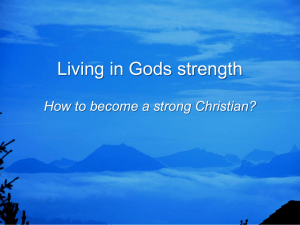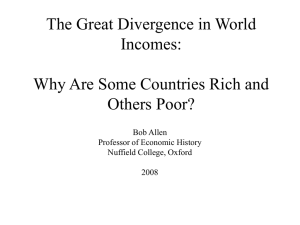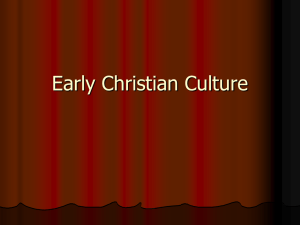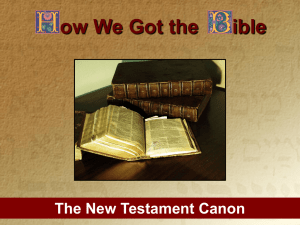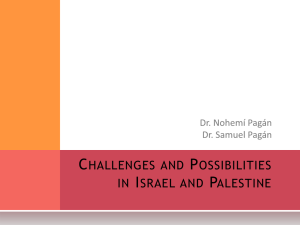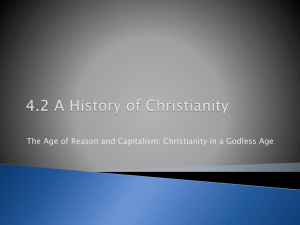0 500 1000 1500 2000 1914
advertisement
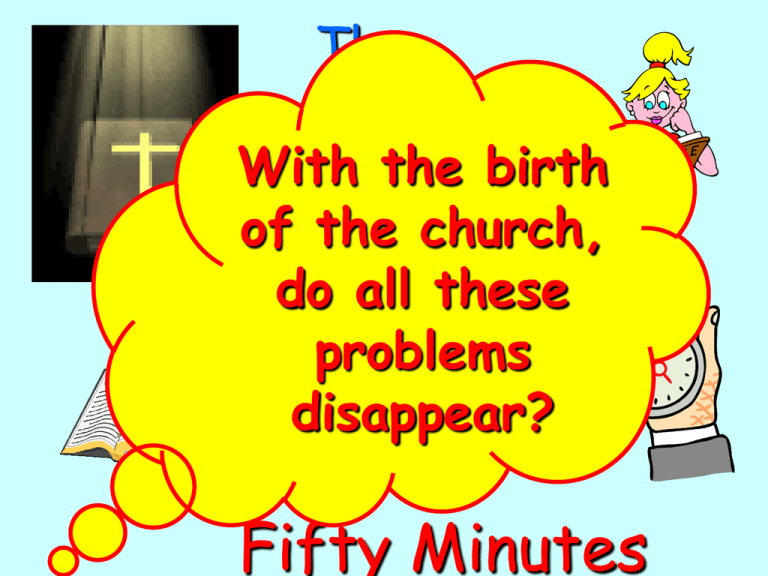
The
Entire
With the birth
of the church,
Story
of
the
do all these
problems
disappear?
Church
in
x
Fifty Minutes
The
Entire Story
of the
Church
in
Fifty Minutes
“History repeats itself.
Has to.
No-one listens.”
What “spectacles” are we
looking through?
the selectivity of those who made records
generations of church history
interpretation
what I think is important! – including the
understanding of the cross, and the working
of the Holy Spirit, the work of the church
We have to understand the CONTEXT
WHEN THESE EVENTS OCCURED
0
500
1000
1500
2000
2006
0
500
1000
1500
2000
2006
0
500
1000
1500
Key events , issues and people
2000
2004
0
500
1000
1500
Key events , issues and people
Statistics, geographical spread
2000
2004
0
500
1000
1500
2000
Key events , issues and people
Statistics, geographical spread
The supernatural work of the Holy Spirit
2004
0
500
1000
1500
2000
Key events , issues and people
Statistics, geographical spread
The supernatural work of the Holy Spirit
Understanding of why Jesus died
2004
0
500
1000
1500
2000
Key events , issues and people
Statistics, geographical spread
The supernatural work of the Holy Spirit
Understanding of why Jesus died
What’s happening in the UK
2003
0
500
1000
1500
2000
Key events , issues and people
Statistics, geographical spread
The supernatural work of the Holy Spirit
Understanding of why Jesus died
What’s happening in the UK
What we can learn
33-313
0
500
1000
1500
The Spreading Fire …
2000
33-313
0
500
1000
1500
2000
The Rapid Spreading of the Good News
enabled by effective transport,
communication, and “Pax Romana”
overseen by apostles
early persecution prompts widening
circle – Jerusalem, Judea, Samaria and
beyond
49 AD
54 AD
58 AD
The Spreading Fire …
33-313
0
500
1000
1500
2000
Understanding the place of Jewish faith
“Council of Jerusalem” AD 44
(no need for convert to become a Jew to be a Chrsitain)
Council of Jamnia
c AD 90
(Christians excluded from synagogues as heretics)
The Spreading Fire …
33-313
0
500
1000
1500
2000
Challenges of change as time passes
x
Jesus hasn’t returned!
the apostles have all died
The Spreading Fire …
33-313
0
500
1000
1500
2000
Persecution
destruction of Jerusalem (AD 70)
scatters Christians
ongoing danger under Roman rule
varied – worst offenders
Nero (60s) and Domitian (90s)
The Spreading Fire …
33-313
0
500
1000
1500
2000
The Spreading Fire …
33-313
0
500
1000
1500
2000
Persecution
destruction of Jerusalem (AD 70)
scatters Christians
ongoing danger under Roman rule
varied – worst offenders
Nero (60s) and Domitian (90s)
recognising martyrs.
(emergence of god-parents)
The Spreading Fire …
33-313
0
500
1000
1500
2000
Defining faith & combating heresy
Gnosticism
Docetism
Special knowledge; physical = evil
Jesus only appeared to suffer
Justin Martyr
Irenaeus
c 100 – c 165
Faith & reason
c 130 – c 200 First great theologian
Tertullian c 160 – c 225
Most of Bible accepted by AD 200
The Spreading Fire …
33-313
0
500
1000
1500
2000
Emergence of Christian monasticism
in Egypt – Antony (?251-356) pursues
disciplines & holiness in desert
foundations of Coptic church
The Spreading Fire …
33-313
0
500
1000
1500
2000
By this time …
Aided by easy travel in the Roman
Empire, Christian faith in the near East,
much of Europe, parts of N. and Central
Africa, India, Sri Lanka, Afghanistan
12% of the world is Christian
of these 66% non-white, 34% white
world 36% evangelised
“There is no nation indeed that is not
Christian” Tertullian, AD 197
scriptures in 13 languages The Spreading Fire …
33-313
0
500
1000
1500
2000
“The prophetical gifts remain with us …”
Justin Martyr (c 100 – c 165)
“Some do certainly and truly drive out
devils … others have foreknowledge of
things to come … others still, heal the
sick … the dead even have been raised
up …” (Irenaeus 140 – 203)
“How many … have been delivered from
devils, and healed of diseases!”
(Tertullian, c 160 – c 215)
The Spreading Fire …
33-313
0
500
1000
1500
2000
understanding rooted in experience
and the examination of (Old
Testament) scripture
victory over powers of death and sin
sacrifice
the death of God’s servant in our place
(but as representative rather than substitute)
Origen (c185 – c254) death of Jesus =
ransom paid to Satan
The Spreading Fire …
33-313
0
500
1000
1500
2000
Christian faith first reaches Britain
around AD 61 through Roman soldiers
& merchants
origin of Celtic churches
The Spreading Fire …
33-313
0
500
1000
1500
2000
God uses persecution and suffering
important task of defining faith
how much can be done without church
buildings! (first permanent church buildings c. AD200)
The Spreading Fire …
0
500
1000
1500
Respectability!
2000
313500
0
500
1000
1500
2000
313500
“conversion” of Constantine
Christian faith first legalised, (313) then
compelled (394)
Respectability!
0
500
1000
1500
2000
313500
“conversion” of Constantine
Christian faith first legalised, (313)
then compelled (394)
Constantine’s mother, Helena, starts
building churches over Holy Land sites
The Church of the Holy
Sepulchre, Jerusalem
Respectability!
0
500
1000
1500
2000
313500
“conversion” of Constantine
Christian faith first legalised, (313) then
compelled (394)
Constantine’s mother, Helena, starts
building churches over Holy Land sites
Arian heresy (Jesus = the Son but not truly divine)
rejected at Council of Nicea (325)
Capital of Roman Empire moved to
ByzantiumConstantinople Istanbul
(foundations of East/West divide)
Respectability!
0
500
1000
1500
2000
313500
Constantinople •
Rome •
Respectability!
0
500
1000
1500
2000
313500
canon of New Testament agreed (367)
creeds developed to define faith
(Nicene ?381)
Vulgate (Latin translation of Bible) completed by
Jerome (404)
Augustine of Hippo completes “City of
God” (426) “Believe in order to understand”
conversion by community
(c 450)
end of Roman Empire in West (476)
Respectability!
0
500
1000
1500
2000
313500
By this time …
Christian faith now further into Africa
(Ethiopia?, Sudan), widely into central Asia
22% of the world is Christian
of these 62% non-white, 38% white
80% of Roman Empire is Christian
world 42% evangelised
scriptures in 13 languages
“From India to Britain, all nations resound
with the death and resurrection
of Christ” (Jerome, 378)
Respectability!
0
500
1000
1500
2000
313500
“It is sometimes objected that the
miracles, which Christians claim to have
occurred, no longer happen … The truth
is that even today miracles are being
wrought in the name of Christ,
sometimes through His sacraments and
sometimes through the intercession of
the relics of his saints”. (Augustine, 354-430)
This account, in “The City of God”, continues to give many
specific examples of healing and raising from death
Respectability!
0
500
1000
1500
2000
313500
In this era, the theological
focus is on Jesus being fully
God, and the nature of the
Trinity – there is no significant
development of understanding
about why Jesus died for us
Respectability!
0
500
1000
1500
2000
evidence of organised church in
England – bishops attend council!
313500
(314)
first Christians (monks from Crete) reach
Hibernia (= Ireland) (350)
Patrick evangelises Ireland (432)
Respectability!
0
500
1000
1500
2000
evidence of organised church in
England – bishops attend council!
313500
(314)
first Christians (monks from Crete) reach
Hibernia (= Ireland) (350)
Patrick evangelises Ireland (432)
first Christians on the Isle of Man
(442)
Respectability!
0
500
1000
1500
2000
313500
advantages and disadvantages of linking
church and state
essential to defend Jesus and the Holy
Spirit as fully God (e.g.in answering cults)
Respectability!
0
500
1000
1500
Disintegration
2000
500950
0
500
1000
1500
2000
500950
Disintegration in society
the “Dark Ages”
no Emperor in West
urban life virtually disappears
Disintegration
0
500
1000
1500
2000
500950
The abuse of power
the rise of an institutional church
in the West, political power for the Pope
rivalry between Rome & Constantinople
forced baptisms:
c 540 - Emperor Justinian – 70,000 – Asia Minor
c 780 - Charlemagne – Saxon race. Pope Leo III crowns
Charlemagne as first “Holy Roman Emperor” in 780
c 870 – Boris, King of the Bulgars - Serbs
Disintegration
0
500
1000
1500
2000
500950
The rise of Islam
622 Muhammad’s flight Mecca Medina
638
Jerusalem falls to Muslims
660
mass conversions to Islam in Egypt
697
North Africa under Muslim control
837
Prohibitions for Christians in Egypt
949
50% of former Christendom now
under Muslim control
Disintegration
0
500
1000
1500
2000
500950
Some positive dimensions …
rise of Western monasticism
Benedict, 529; Odo at Cluny 927-942
continuing geographical spread of
gospel
vigour of Celtic Christianity
+
Disintegration
0
500
1000
1500
2000
500950
By this time …
Christian faith has reached untouched
parts of Europe (Netherlands, East Germany,
Sweden, Denmark, Norway, Czechoslovakia); Mongolia,
Indonesia, Burma, Pakistan, Iceland.
In parts of China, it is becoming the
dominant religion
… but now only 19% of world Christian
… of which 58% white, 42% non white
world 26% evangelised
scriptures in 17 languages
Disintegration
0
500
1000
1500
2000
500950
Records of supernatural works of
the Holy Spirit in this era are sparse,
but they are there …
for example in the ministry of
Gregory of Tours
(c 538-594: healing, deliverance, raising the dead)
and Gregory the Great
(540-604: visions, prophecy & miracles)
Disintegration
0
500
1000
1500
2000
500950
No significant development
Disintegration
0
500
1000
1500
2000
500950
c 510
for next 400 years, Irish “Peregrini”
c 550
Christianity reaches Channel Islands
563
Scotland evangelised by Columba
(from Ireland)
Disintegration
0
500
1000
1500
2000
500950
c 510
for next 400 years, Irish “Peregrini”
c 550
Christianity reaches Channel Islands
563
596
Scotland evangelised by Columba
(from Ireland)
Augustine sent by Pope to
England; baptises King (597)
& 10,000 Saxons;
parliament adopts Christian faith
Disintegration
0
500
1000
1500
2000
500950
c 510
for next 400 years, Irish “Peregrini”
c 550
Christianity reaches Channel Islands
563
596
Scotland evangelised by Columba
(from Ireland)
Augustine sent by Pope to
England; baptises King (597)
& 10,000 Saxons;
parliament adopts Christian faith
c 670
730
songs of Caedmon
Bede’s “Church History of the English People”
Disintegration
0
500
1000
1500
2000
500950
the inheritance left by each generation
the dangers of civil power and
compulsion regarding Christian values
how Islam looks compared
to Christian faith
the values of
the Celtic
church
Chapel at the Northumbria Community
Disintegration
0
500
1000
1500
A Golden Age
of Spirituality
(and Holy War)
2000
9501350
0
500
1000
1500
2000
9501350
Renewal-focussed monasticism
Christian mysticism – St Bernard
of Clairvaux (1090-1153)
Cluny – return to “pure” Benedictine
(but integrated to society)
St Francis of Assisi
Franciscans
(1186-1226)
Spirituality
(and Holy War)
0
500
1000
1500
2000
9501350
Renewal-focussed monasticism
Christian mysticism – St Bernard
of Clairvaux (1090-1153)
Cluny – return to “pure” Benedictine
(but integrated to society)
St Francis of Assisi
Franciscans
(1186-1226)
Dominic
(1170-1221)
Dominicans
Spirituality
(and Holy War)
0
500
1000
1500
2000
9501350
Challenge to the Institutional church
Peter Valdes (d. c 1210) - movement of
preaching, voluntary poverty; rejecting
worldliness, church clericalism,
hierarchy, saints & relics
Waldensians
Church treats as heresy …
then friars adopt many of their values regarding simplicity!
1199
Pope Innocent III & Inquisition
Conflict between Popes & Kings
Pope to France in 1305
Spirituality
(and Holy War)
0
500
1000
1500
2000
9501350
Serious & Systematic thinking
Anselm of Canterbury (c 1033 – 1109)
Peter Abelard (1079 – 1102)
Thomas Aquinas (c 1225 – 1274)
“Summa Theologica” “Five Ways”
(In 1879, Pope declares Aquinas’s
theology eternally valid)
Spirituality
(and Holy War)
0
500
1000
1500
2000
9501350
Serious & Systematic thinking
Anselm of Canterbury (c 1033 – 1109)
Peter Abelard (1079 – 1102)
Thomas Aquinas (c 1225 – 1274)
“Summa Theologica” “Five Ways”
(In 1879, Pope declares Aquinas’s
theology eternally valid)
William of Ockham (c 1290-1349)
Spirituality
(and Holy War)
0
500
1000
1500
2000
9501350
… but also some less helpful things …
“Great Schism” between West (Rome)
and East (Constantinople)
1054
x
Spirituality
(and Holy War)
0
500
1000
1500
2000
9501350
… but also some less helpful things …
1095
start of Crusades
1099
1187
1228
1244
1291
Jerusalem taken
Jerusalem lost
Jerusalem regained (by negotiation)
Jerusalem recaptured by Muslims
final fall of Crusader states
x
Spirituality
(and Holy War)
0
500
1000
1500
2000
9501350
… but also some less helpful things …
1347
Black Death sweeps across Europe: 33% killed
Spirituality
(and Holy War)
0
500
1000
1500
2000
9501350
By this time …
Christian faith has reached Poland,
Greenland, Finland, Gibraltar, Ukraine;
x
but the church in North Africa is almost extinguished.
1266: missed opportunity: Kubla Khan: Russia, Persian
“Send me 100 men skilled in
your religion … and so I shall be
baptised, and then all my barons
and great men, and then their
subjects. And so there will be
more Christians here than there
are in your parts …”
Spirituality
(and Holy War)
0
500
1000
1500
2000
9501350
By this time …
Christian faith has reached Poland,
Greenland, Finland, Gibraltar, Ukraine;
x
but the church in North Africa is almost extinguished.
1266: missed opportunity: Kubla Khan: Russia, Persian
… 24% of world Christian …
… 67% white, 33% non white
the world is 28% evangelised
scripture in 28 languages
Spirituality
(and Holy War)
0
500
1000
1500
2000
9501350
“… concerning this anointing of the
sick, we hold it as an article of faith,
and profess sincerely from the heart
that sick persons, when they ask it,
may lawfully be anointed with the
anointing oil by one who joins them in
praying that it may be efficacious to
the healing of the body …”
The Waldensians
Spirituality
(and Holy War)
0
500
1000
1500
2000
9501350
first developed doctrine
of why Jesus died
“Cur Deus Homo”
Anselm
c1033-1109
Archbishop of
Canterbury 1093
based on mediaeval honour
What could repay the
debt of honour owed to
God by human rebellion?
(“objective” theory of atonement)
Spirituality
(and Holy War)
0
500
1000
1500
2000
9501350
love affair with Heloise
Peter
Abailard
effect of Calvary is
through the response of
love that it evokes in the
sinner
(“subjective” theory of atonement)
1070-1142
x
Spirituality
(and Holy War)
0
500
1000
1500
much church-building
2000
9501350
(romanesque & gothic)
issues of state and church: Henry II
sought superiority for the state over
the church’s courts
murder of Thomas Becket
(?1118-1170)
Spirituality
(and Holy War)
0
500
1000
1500
2000
9501350
rhythms of monastic life
value of systematic theology
issue of Holy War
Spirituality
(and Holy War)
0
500
1000
1500
Confusion &
Corruption
13501500
2000
0
500
1000
1500
13501500
2000
Spiritual ground lost
1378
The (second) Great Schism (choice of Popes)
1415
Jan Hus martyred for seeking reform
1478
The Spanish Inquisition
1480s
Church grows in wealth; Popes grow
in corruption (Borgias); St Peter’s &
Sistine chapel built;
start of shift from “universal” to “national” church
Confusion & Corruption
0
500
1000
1500
13501500
2000
More geographical territory lost
Mongols take China, India, Asia, parts of
Mediterranean
Confusion & Corruption
0
500
1000
1500
13501500
2000
Some positives
Growth of Christian mysticism
Catherine of Siena, “The Cloud of Unknowing”, Julian of
Norwich
Thomas à Kempis (c1380-1471) The Imitation of Christ
First printing
(1450)
leads to more Bibles
Mission (Franciscan & Dominican) to Muslims & to
Central Asia; start of Portugese &
Spanish exploration to the West
Confusion & Corruption
0
500
1000
1500
13501500
2000
Christian faith has reached Senegal,
Zaire, Nigeria, Kenya, Haiti, Dominican
Republic but virtually extinct in Central Asia
19% of world is Christian
… of which 92% white
world 21% evangelised
printed scriptures available in
12 languages
Confusion & Corruption
0
500
1000
1500
13501500
2000
Colette of Corbi
known for miraculous works
Confusion & Corruption
0
500
1000
1500
13501500
2000
No significant development
Confusion & Corruption
0
500
1000
1500
13501500
2000
John Wyclif c 1329-1384.
Opposed corrupt clergy, transubstantiation.
First English Bible. Followers=“Lollards”
Confusion & Corruption
0
500
1000
1500
13501500
2000
The dangers of church wealth
and political power
Confusion & Corruption
0
500
1000
Reform
1500
(and reactions to it)
15001650
2000
0
500
Martin Luther
1000
1500
15001650
2000
1483 -1546
1517
Academic paper by obscure monk
1520
Excommunicated
Rejected theology based solely on tradition; and
“indulgences”. Sought personal understanding &
experience of God’s word
x
1521 Diet of Worms
“Against the Roman Papacy,
instituted by the Devil”
1545
Reform (and reactions to it)
0
500
Martin Luther
1000
1500
15001650
2000
1483 -1546
1517
Academic paper by obscure monk
1520
Excommunicated
Rejected theology based solely on tradition; and
“indulgences”. Sought personal understanding &
experience of God’s word
x
1521 Diet of Worms
“Against the Roman Papacy,
instituted by the Devil”
1545
Reform (and reactions to it)
0
500
Martin Luther
1517
1000
1500
15001650
2000
1483 -1546
Academic paper by obscure monk
Rejected theology based solely on tradition; and
“indulgences”. Sought personal understanding &
experience of God’s word
x
“Should the devil
come to me 1521
byDiet of Worms
1520 Excommunicated
harass
1545 night
“Againstand
the Roman
Papacy,
instituted
Devil”him
me, byI the
drive
x
x
away with a f**t”
Reform (and reactions to it)
0
500
1000
1500
15001650
2000
Reformation principles
Church founded on scripture
Reject authority of Pope, good works, indulgences,
mediation of Mary, transubstantiation, mass=sacrifice,
prayers for dead, celibacy of clergy, private confession to
priest, Latin, associated paraphenalia
Salvation by grace alone
Priesthood of all believers
John Calvin
(1509-1564)
“Institutes”
Reform (and reactions to it)
0
500
1000
1500
15001650
2000
Reformation principles
Church founded on scripture
Reject authority of Pope, good works, indulgences,
mediation of Mary, transubstantiation, mass=sacrifice,
prayers for dead, celibacy of clergy, private confession to
priest, Latin, associated paraphenalia
Salvation by grace alone
Priesthood of all believers
John Calvin
(1509-1564)
“Institutes”
Reform (and reactions to it)
0
500
1000
1500
15001650
2000
Reaction to the Reformation
Anabaptists
Most radical reformers; adult baptism
Council of Trent
(1545-1563)
Dealt with most flagrant abuses, but reaffirmed
mediaeval orthodoxy
Birth of non-conformity in England
Reform (and reactions to it)
0
500
1000
1500
15001650
2000
Christian faith reaches much of South
America, much of southern Africa, the
Far East, the USA (1526), Canada (1534),
Japan
world is 21% Christian
… of which 83% white
printed scriptures in 45 languages
Reform (and reactions to it)
0
500
1000
1500
15001650
2000
Luther instructs on deliverance &
prophecy
Ignatius of Loyola speaks of the freedom
of the Spirit to distribute gifts as He
wills
Teresa of Avila talks of a language of the
Spirit used in prayer
Quakers shake
Reform (and reactions to it)
0
500
1000
1500
15001650
2000
Luther rejects “satisfaction”, teaches
voluntary substitution
Calvin advocates “Penal” theory
Law inherently requires that punishment must be made
Is forgiveness real? Difficult implications for trinity?
Father who cannot look on sin,
Son who is friend of sinners
Father’s wrath must be
satisfied, Son appeases Him
Reform (and reactions to it)
0
500
1000
1500
15001650
2000
The State
1534
1555/6
Henry VIII proclaims
himself Head of
Church of England
“Martyrdom” of Ridley,
Latimer, Cranmer
(Queen Mary)
1560
Act of Uniformity
Reform (and reactions to it)
0
500
1000
15001650
1500
2000
Birth of nonconformity
Puritans
latter 16th century
Congregationalists
from 1581
Baptists
from 1608
Quakers
from c 1650
x
Reform (and reactions to it)
0
500
1000
1500
15001650
2000
personal faith
rejection of meaningless tradition
centrality of Scripture
grace not works
priesthood of all believers
“Mercy is when God does not give us
what we deserve;
Grace is when He gives us
what we do not deserve”
Reform (and reactions to it)
0
500
1000
1500
Reason & Revival
16501815
2000
0
500
1000
1500
16501815
2000
Changing world-view: the place of “Reason”
(The Enlightenment)
Descartes
(1596-1650) Doubt. “Cogito ergo sum”
Spinoza
(1632-1677)
Locke
(1632-1704) “tabula rasa”
Hume
(1711-1776)
miracles against nature
Kant
(1724-1804)
impossible to think
coherently about God
x
God = nature
Reason & Revival
0
500
1000
1500
16501815
2000
A season of revival
Jonathan Edwards
Howell Harris
John Wesley
from 1734, New England USA
(1792)
from 1739, Wales
(1785, 1786, 1791, 1805, 1810)
from 1739, England Methodists
George Whitefield from 1741, England & Wales
Reason & Revival
0
500
1000
1500
16501815
2000
A bigger picture of mission
Baptist Missionary Society 1792
Sunday Schools
Robert Raikes 1780
Evangelicals
1783 Charles Simeon, evangelical student movement;
1807 Wilberforce: slave trade;
later (from 1840s),Lord Shaftesbury, social reform
Church Missionary Society 1799
(British & Foreign) Bible Society
1804
Reason & Revival
0
500
1000
1500
16501815
2000
Christian faith has reached Gambia,
Nepal, Falkland Islands, New Zealand,
Australia
world is 24% Christian
… of which 86% white
world 30% evangelised
printed Bible in 44 languages (portions in 86)
Reason & Revival
0
500
1000
1500
16501815
2000
Supernatural manifestations
in revival:
Jonathan Edwards, Wesley
Reason & Revival
0
500
1000
1500
16501815
2000
No significant development in theory;
dread of hell & judgement in revival
Reason & Revival
0
500
From
1000
1800,
1500
16501815
2000
awakenings in Scotland
Reason & Revival
0
500
1000
1500
16501815
2000
God’s sovereign hand in revival
Reason & Revival
0
500
1000
1500
18151914
2000
Industrialisation, Empires &
Institutions
0
500
1000
1500
18151914
2000
Many changes!
Society: industry > urban concentration
Science: Darwin’s theory of evolution
Study:
Biblical criticism
Thinking: Hegel, Marx, Nietzsche
Empires: Russian, British, Belgian, Dutch,
French, US, German …
Industrialisation, Empires & Institutions
0
500
1000
1500
Papal infallibility
1870
France secularised
1870
18151914
2000
growth of evangelical influence
pulpit power authority of scripture; Finney, Moody,
Sankey, C.H. Spurgeon. USA: inter-denominational city
wide mission
structured mission through empire
Hudson Taylor, David Livingstone
Industrialisation, Empires & Institutions
0
500
1000
Azuza Street revival
1500
18151914
2000
(1906 USA) pentecostalism
foundations of ecumenical movement
beginnings of “cults”
Mormons 1830,
Christadelphians 1844, Jehovah’s witness 1870, Christian
Scientists 1879, Spiritualists 1893
Industrialisation, Empires & Institutions
0
500
1000
1500
18151914
2000
Christian faith continues to reach into
Africa, Hong Kong, isolated islands
world 34% Christian
… of which 76% white
world 52% evangelised
printed scriptures in 676 languages
Industrialisation, Empires & Institutions
0
500
1000
1500
18151914
2000
Resurgence of gifts of
tongues, prophecy, healing;
manifestations in revivals in Wales.
“Second blessing” theology emerges
Little impact in “mainstream” of church
Industrialisation, Empires & Institutions
0
500
1000
1500
18151914
2000
Exploration of dimension of penitence
(“penitentiaries” in USA)
leads to growth in “subjective” theories
about why Jesus died
Industrialisation, Empires & Institutions
0
500
1000
1500
growth of non-conformity
Brethren
18151914
2000
church/chapel divide
1827
repealed laws re nonconformists & RCs
1828 >
awakening in Scottish Highlands 1839-43
the Oxford Movement
1845
250 clergy enter church of Rome by 1862
Industrialisation, Empires & Institutions
0
500
1000
1500
2000
revival in England, Scotland &Wales
Cornish revivals
1861
Salvation Army
1865
Keswick Covention
1875
revival in Wales
disestablishment:
18151914
1859
1904/5 Evan Roberts > world
Ireland 1869 Wales 1914
Industrialisation, Empires & Institutions
0
500
1000
1500
18151914
2000
city mission
the whole church of Jesus
Industrialisation, Empires & Institutions
1914 -
0
500
1000
1500
Anxiety, Adaptation &
Anticipation
2000
1914 -
0
500
1000
horror of WW I & II
1500
2000
despair; nuclear threat
Communist purges in USSR from 1917
Persecution of church in soviet bloc, China
refugees from 1945
emerging recognition of
female leadership
Anxiety, Adaptation & Anticipation
1914 -
0
500
1000
1500
2000
growth of Messianic believers
World Council of Churches 1948
mass evangelism
147 churches
1950 Billy Graham
international radio
1954
Albania first Atheist state 1966
failure of economic promise in West
rise of interest in West in other
faiths / new age
Anxiety, Adaptation & Anticipation
1914 -
0
500
1000
1500
2000
decline of church in West
growth of church in Africa
South America from 1970s
from 1950s,
Rise of Pentecostals /
charismatics
more appropriate recognition
of indigenous churches
Anxiety, Adaptation & Anticipation
1914 -
0
500
1000
1500
2000
Pope & Patriarch meet 1964 first time in 900 yrs!
expansion of evangelicalism
Church of North India
1970
Liberation Theology
South America 1970s, Palestine
City-wide movements
Korea (prayer mountains, world’s largest church)
South America (power of unity)
Anxiety, Adaptation & Anticipation
1914 -
0
500
1000
1500
2000
March for Jesus
United world-wide witness by millions
emergence of deeper intimacy
in worship
Anxiety, Adaptation & Anticipation
1914 -
0
500
1000
1500
2000
only most isolated regions not touched
world is 32% Christian
… 50% white
world 75-85% evangelised
93% have church in own culture; 98% has resident national or
expatriot witness
printed scriptures in 2708 languages
{405 whole Bible; 1034 NT; 864 some scripture}
Anxiety, Adaptation & Anticipation
1914 -
0
500
1000
1500
2000
growth of charismatic belief
345 million
renewal movements
Anxiety, Adaptation & Anticipation
1914 -
0
500
1000
1500
2000
themes of
healing of relationship,
reconciliation,
return of prodigal
Anxiety, Adaptation & Anticipation
1914 -
0
500
1000
1500
2000
The whole church
challenge of multi-faith society
movements towards structural unity
United Reformed Church
unity as foundation for mission
partly as a response to massive numerical decline
Anxiety, Adaptation & Anticipation
1914 -
0
500
1000
1500
2000
Renewal
Smith Wigglesworth
1947: Word and Spirit prophecy
charismatic renewal
1960 > C of E 1962 > RCs 1967
John Wimber
Toronto
from 1980s
from 1994
Anxiety, Adaptation & Anticipation
1914 -
0
500
1000
1500
2000
partnership & reconciliation in church
recognise we don’t have right to be heard!
honesty in “renewal”
accept that the Holy Spirit may surprise
us again!
Anxiety, Adaptation & Anticipation
x
